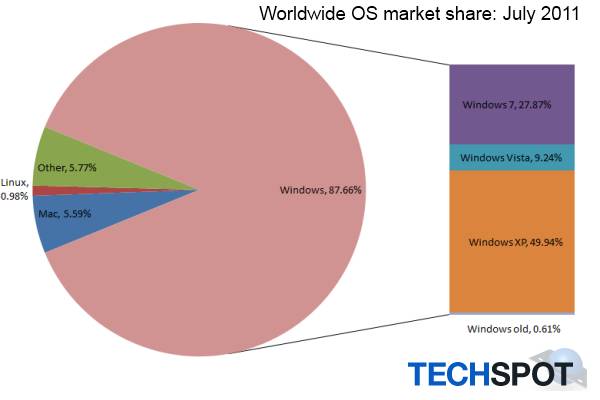At the end of July 2011, Microsoft can say that Windows XP finally fell below the 50 percent mark. In other words, Redmond's decade-old operating system is now used by less than half of all Internet users.
Windows XP's market share is eroding, and Windows in general is slowly slipping as well: between June and July, it fell 0.63 percentage points (from 88.29 percent to 88.76 percent). At the same time, Mac OS gained 0.22 percentage points (from 5.37 percent to 5.59 percent) and Linux gained 0.03 percentage points (from 0.95 percent to 0.98 percent). Unsurprisingly, mobile operating systems gained share.

In the same time period, Windows 7 gained 0.74 percentage points (from 27.13 percent to 27.87 percent). Windows Vista meanwhile slipped 0.28 percentage points (from 9.52 percent to 9.24 percent) and Windows XP fell 1.19 percentage points (from 51.13 percent to 49.94 percent). In about a year's time, we should see Windows 7 pass Windows XP altogether.
By the end of 2010, Windows 7 had grabbed 20 percent of the market and at the end of April 2011, Windows 7 passed the 25 percent mark. Last month, Microsoft announced that Windows 7 had sold more than 400 million licenses in the last 21 months. This means that Microsoft is selling just fewer than 20 million licenses per month. Back to school season is coming up, followed by the holiday shopping frenzy, so that number should remain stable till 2012 at least.
Although Windows 7 is growing its share very quickly, the ancient Windows XP is still dominating. Microsoft knows this and is making its own attempts to woo users off the platform. The software giant still supports those using XP, despite its hate for the ancient OS.
On April 14, 2009, Microsoft retired Mainstream Support for XP, and with it, support for IE6. The company is not planning to retire Extended Support for the operating system until April 8, 2014. If the company ends up releasing XP SP4 (highly unlikely), it will retire support for SP3 (released in April 2008) two years later, or in April 2014, whichever comes first. In short, Windows XP will continue to be officially supported by Microsoft for about three more years. Despite the support options, Redmond still wants XP and IE6 to die.
Three months ago, even the National Security Agency (NSA) began advising users to upgrade from Windows XP to either Windows Vista or Windows 7. Furthermore, the organization says that when possible, choosing a 64-bit version of Windows is recommended.
https://www.techspot.com/news/44902-windows-xp-usage-finally-falls-below-50-mark.html